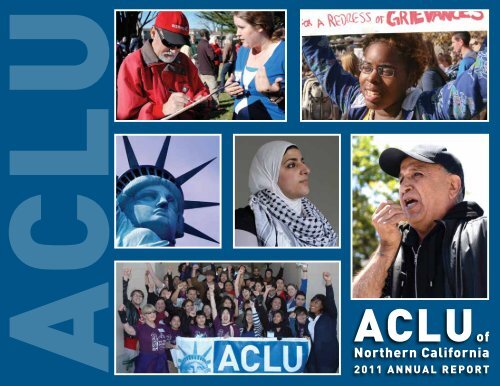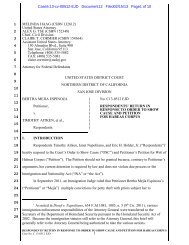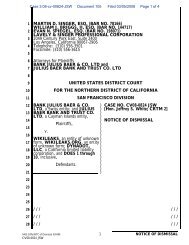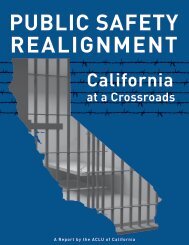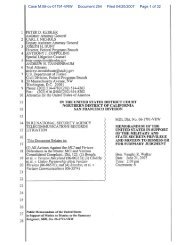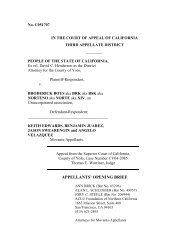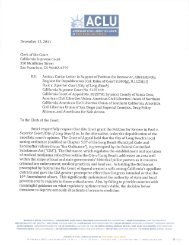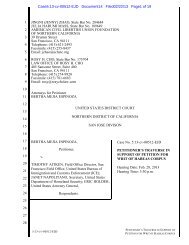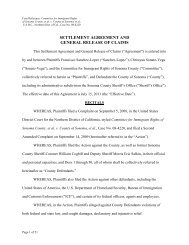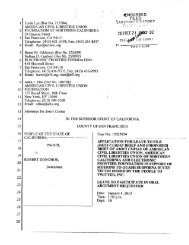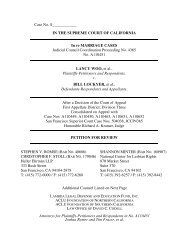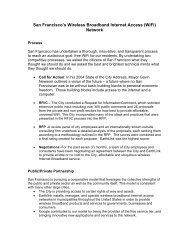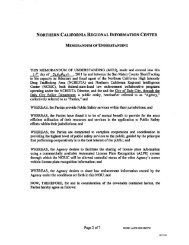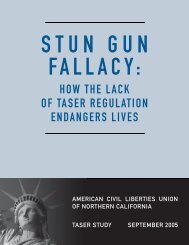Download - ACLU of Northern California
Download - ACLU of Northern California
Download - ACLU of Northern California
You also want an ePaper? Increase the reach of your titles
YUMPU automatically turns print PDFs into web optimized ePapers that Google loves.
<strong>ACLU</strong><br />
Our<br />
<strong>ACLU</strong><strong>of</strong><br />
<strong>Northern</strong> <strong>California</strong><br />
2011 Annual Report
<strong>ACLU</strong> <strong>of</strong> <strong>Northern</strong> <strong>California</strong><br />
2011 Annual Report<br />
Table <strong>of</strong> Contents<br />
2 Community Engagement<br />
4 Free Speech<br />
6 Criminal Justice<br />
8 Replacing the Death Penalty<br />
9 national Security<br />
10 Immigrants' Rights<br />
12 Students' Rights<br />
14 Reproductive Justice<br />
16 LGBT Equality<br />
17 Rights <strong>of</strong> the Economically Disadvantaged<br />
18 Technology and Civil Liberties<br />
20 The Strategic Affiliate Initiative<br />
21 Racial Justice<br />
22 Thank You to Our Volunteers<br />
26 Our Donors<br />
38 Financial Report<br />
40 Staff and Board<br />
WRITER: Emily Whitfield<br />
DESIGNER: Gigi Pandian<br />
PRINTER: Madison Street Press<br />
COVER PHOTOGRAPHY: Anaïs Dodson (lower right),<br />
David Felsen (middle right), Eric H<strong>of</strong>fman (upper right),<br />
Laura Saponara (lower left and upper left).
Legacies and New Beginnings<br />
In addition to the breadth <strong>of</strong> work we do across <strong>Northern</strong> <strong>California</strong>, this year marks a<br />
new beginning: the heightened collaboration <strong>of</strong> the <strong>ACLU</strong> <strong>California</strong> affiliates as the<br />
“<strong>ACLU</strong> <strong>of</strong> <strong>California</strong>.”<br />
The <strong>ACLU</strong> <strong>of</strong> Southern <strong>California</strong> was founded in 1923 with the forceful advocacy <strong>of</strong><br />
Upton Sinclair on Liberty Hill. A decade later, the <strong>ACLU</strong> <strong>of</strong> <strong>Northern</strong> <strong>California</strong> was<br />
founded during the 1934 general strike in San Francisco. Initially a chapter <strong>of</strong> the <strong>ACLU</strong><br />
<strong>of</strong> Southern <strong>California</strong> that was started in 1933, the <strong>ACLU</strong> <strong>of</strong> San Diego and Imperial<br />
Counties became a free-standing affiliate in 1988.<br />
For several decades, the three <strong>ACLU</strong> affiliates in <strong>California</strong> have jointly funded and supported<br />
our Legislative Office in Sacramento. The Sacramento Bee and <strong>California</strong> Watch<br />
recently ranked our legislative program as the #4 most effective lobbying operation in<br />
Sacramento, alongside groups with vastly larger budgets. Throughout these years we<br />
have collaborated in a number <strong>of</strong> other ways.<br />
Building on this success, the <strong>ACLU</strong> <strong>of</strong> <strong>California</strong> is a new strategic partnership <strong>of</strong> the<br />
three <strong>California</strong> <strong>ACLU</strong> affiliates. Each affiliate retains its autonomy and its unique focus<br />
on its own region’s needs. But increasingly, we will pool our resources, strategic thinking,<br />
and program strategies to generate the maximum civil liberties impact for the<br />
state and our communities. With over 100,000 members and 100 staff statewide, we see<br />
this collaboration in our work across the state:<br />
Michelle Welsh and Abdi Soltani. Photo by GIGI PANDIAN.<br />
• Engaging our boards, staffs, and supporters statewide to become better informed <strong>of</strong> the civil liberties issues facing our state, from our border with Mexico to the<br />
border with Oregon.<br />
• Working with college students as the next generation civil liberties leaders through outreach to CSU, UC, community colleges and student associations statewide.<br />
• Filing ambitious cases that require plaintiffs statewide and challenge state institutions.<br />
• Advocating for county and state policy reforms, for example on criminal justice realignment, immigrants’ rights, safe schools for LGBT youth, and access to reproductive<br />
services.<br />
• Supporting ballot measures, such as our vigorous advocacy for the SAFE <strong>California</strong> Act to replace the death penalty with life without the possibility <strong>of</strong> parole.<br />
• Providing resources to <strong>ACLU</strong> state <strong>of</strong>fices nationwide, for example the new Mi<strong>ACLU</strong> bilingual website, www.miaclu.org, to better inform and engage the Latino community.<br />
We are proud <strong>of</strong> our legacy and accomplishments as the <strong>ACLU</strong> <strong>of</strong> <strong>Northern</strong> <strong>California</strong>. And we are truly energized by the vision and possibilities <strong>of</strong> a coordinated, statewide<br />
strategy for the <strong>ACLU</strong> across <strong>California</strong>.<br />
Yours,<br />
Abdi Soltani, Executive Director<br />
Michelle Welsh, Board Chair<br />
1
Community Engagement<br />
A New Hub for Civil Liberties in the Central Valley<br />
Few people know that the Central Valley, which produces many <strong>of</strong> the fruits<br />
and vegetables consumed in America, is also one <strong>of</strong> the poorest areas <strong>of</strong> the<br />
country, home to four <strong>of</strong> the nation’s ten largest metropolitan areas with the<br />
worst poverty levels.<br />
On just about any indicator <strong>of</strong> inequality or civil liberties, the Central Valley<br />
faces great challenges. In response, we’ve been stepping up our community<br />
engagement efforts in the region. This year saw the opening <strong>of</strong> <strong>ACLU</strong>-<br />
NC’s first <strong>of</strong>fice and the hiring <strong>of</strong> our first staff in the Central Valley. One<br />
<strong>of</strong> these staffers, Pam Whalen, has engaged community residents to press<br />
county <strong>of</strong>ficials to put money into treatment and rehabilitation programs<br />
instead <strong>of</strong> expanding jails.<br />
The Rubber Meets the Road on the Campaigns for Justice Tour<br />
Executive Director Abdi Soltani and <strong>ACLU</strong>-NC staffers spent much <strong>of</strong> Spring<br />
2011 hitting the road for the <strong>ACLU</strong>-NC’s “Campaigns for Justice” tour. They held<br />
community meetings in 17 cities and visited 12 campuses as part <strong>of</strong> our Community<br />
and Campus Network outreach. In the fall they visited another dozen<br />
campuses and recruited a diverse range <strong>of</strong> dynamic student leaders to attend<br />
the <strong>ACLU</strong> <strong>of</strong> <strong>California</strong>’s first-ever Social Justice Conference for college leaders,<br />
which took place in January 2012.<br />
Training the Trainers, Far and Wide<br />
Demand for our “Know Your Rights” trainings continue to be high—so<br />
much so that we’re now working on “training the trainers” so we can fulfill<br />
more requests. We have trained 150 Spanish speakers to conduct "Know<br />
Your Rights" presentations in <strong>California</strong>. We also answered the call when the<br />
<strong>ACLU</strong> <strong>of</strong> Alabama asked for help in presenting Spanish-language “KYR” trainings<br />
in response to the state’s passage <strong>of</strong> an Arizona-style anti-immigrant<br />
law. <strong>ACLU</strong>-NC staffer Daniel Galindo packed his bags and spent 10 busy days<br />
helping our colleagues empower Alabama’s immigrant community. Among<br />
the results: the creation <strong>of</strong> the first committee for immigrant rights in Alabama’s<br />
Baldwin County, made up <strong>of</strong> community members, business owners,<br />
and clergy. ¡Si se puede!<br />
mi<strong>ACLU</strong><br />
<strong>ACLU</strong>-NC is also leading the<br />
way online, with the 2011<br />
launch <strong>of</strong> the <strong>ACLU</strong>’s first-ever<br />
dedicated Spanish-language<br />
website. With the participation<br />
<strong>ACLU</strong> <strong>California</strong> affiliates<br />
and the National <strong>of</strong>fice,<br />
“mi<strong>ACLU</strong>” showcases our spirited defense <strong>of</strong> civil liberties across all areas.<br />
As rapid demographic shifts powerfully reshape the cultural and political<br />
landscape <strong>of</strong> <strong>California</strong> and the nation, we expect that Spanish-speaking<br />
and bilingual immigrants and their supporters will be a key audience seeking<br />
information and advocacy opportunities about the many civil liberties<br />
issues that affect us all. We’ve already documented a noticeable “bump”<br />
when <strong>ACLU</strong>-NC staffers discuss our issues on Univision and in other Spanish-language<br />
outlets, and we expect interest to surge further in 2012<br />
when the Supreme Court issues its widely anticipated ruling on SB1070,<br />
Arizona’s anti-immigrant law.<br />
At right, two images from the <strong>ACLU</strong>-NC 2011 Campaigns for Justice tour (top),<br />
and volunteer organizers working with the <strong>ACLU</strong>-NC.<br />
bottom row Photos by Laura Saponara.<br />
2
Free Speech<br />
The Meme Seen ‘Round the World<br />
One <strong>of</strong> the most memorable—and shocking—images <strong>of</strong> 2011 was UC Davis<br />
police Lt. John Pike dousing seated protesters with pepper spray during a November<br />
18 campus demonstration. The victims <strong>of</strong> the overzealous <strong>of</strong>ficer certainly<br />
haven’t forgotten the experience. Three months after the notorious attack,<br />
19 students and alumni, represented by the <strong>ACLU</strong> <strong>of</strong> <strong>Northern</strong> <strong>California</strong>, filed<br />
a federal lawsuit against University <strong>of</strong>ficials to determine why it happened and<br />
to prevent it from happening again. The students had gathered to demonstrate<br />
against ongoing tuition hikes and to protest recent brutal treatment <strong>of</strong> demonstrators<br />
at UC Berkeley.<br />
“Using military-grade pepper spray and police violence against non-violent student<br />
protesters violates the constitution, and it’s just wrong,” said Michael Risher,<br />
staff attorney at the <strong>ACLU</strong> <strong>of</strong> <strong>Northern</strong> <strong>California</strong>. “When the cost <strong>of</strong> speech is a<br />
shot <strong>of</strong> blinding, burning pepper spray in the face, speech is not free.”<br />
Unfortunately, what happened at UC Davis is not an isolated incident. Across<br />
the state, police are using force to shut down legitimate, nonviolent protest.<br />
Just a week earlier, the UC Berkeley Police Department responded to the<br />
“safety risk” <strong>of</strong> tents on campus by wielding batons against Occupy Cal protesters<br />
who had linked arms. Additionally, the Oakland Police Department is<br />
responsible for firing flash-bang grenades, tear gas, bags filled with lead shot,<br />
and other so-called “less lethal” munitions into crowds <strong>of</strong> peaceful Occupy<br />
Oakland demonstrators. The <strong>ACLU</strong> <strong>of</strong> <strong>Northern</strong> <strong>California</strong> and the National<br />
Lawyers Guild sued OPD over the attacks in November, seeking to stop the<br />
agency from violating its own policies on excessive force and crowd control.<br />
Many <strong>of</strong> these policies were established in the wake <strong>of</strong> an earlier joint <strong>ACLU</strong>-<br />
NLG lawsuit over a similar, notorious attack in 2003 against anti-war protesters.<br />
Teaming up with the Tea Party to Defend Free Speech<br />
When Redding <strong>of</strong>ficials adopted a policy restricting leafleting on the open-air<br />
plaza in front <strong>of</strong> the city library, they didn’t count on the <strong>ACLU</strong> and the Tea Party<br />
teaming up to defend free speech. It was never clear why the City felt the need<br />
to adopt onerous restrictions on leafleting: Before the policy was adopted, <strong>ACLU</strong><br />
and Tea Party members had simultaneously leafleted in the library plaza, without<br />
any disruptions.<br />
The groups sued, and quickly won an injunction against the policy on the ground<br />
that the policy violates the First Amendment and the <strong>California</strong> Constitution. The<br />
city is appealing the ruling. Stay tuned!<br />
UC Davis students Fatima Sbeih, David Buscho, and Sarena Grossjan, who were pepper sprayed during nonviolent protest. Photos below by David Felsen; photo at right by Eric H<strong>of</strong>fman.<br />
4
“In dealing with the Occupy movement,<br />
cities and universities have lost sight <strong>of</strong> the big<br />
picture. The biggest threat to the health and<br />
safety <strong>of</strong> our communities is not a tent on a<br />
lawn or students linking arms. The biggest<br />
threat to us all takes the form <strong>of</strong> a violent police<br />
reaction to peaceful political expression.”<br />
–<strong>ACLU</strong>-NC attorney Linda Lye,<br />
in a San Francisco Chronicle op-ed<br />
5
Criminal Justice<br />
Criminal Justice at the Crossroads<br />
A long overdue revolution in <strong>California</strong>’s criminal justice policy came in 2011<br />
with the passage <strong>of</strong> AB 109, a groundbreaking “realignment” law that will give<br />
counties—rather than the state—responsibility for managing low-level, nonviolent<br />
<strong>of</strong>fenders. The legislative findings contained in the law are remarkable<br />
in their acknowledgment <strong>of</strong> the utter failure <strong>of</strong> 30 years <strong>of</strong> “lock ‘em up and<br />
throw away the key” mentality in <strong>California</strong>.<br />
Our 2012 report finds that realignment is a promising step toward reducing<br />
state prison populations, but it does not go far enough. Going forward, the<br />
<strong>ACLU</strong> <strong>of</strong> <strong>California</strong> is asking state legislators to enact smart sentencing reforms<br />
that would save taxpayers hundreds <strong>of</strong> millions <strong>of</strong> dollars annually and free up<br />
jail and prison space for those who have committed more serious crimes. For<br />
example, making the penalty for possession <strong>of</strong> small amounts <strong>of</strong> drugs a misdemeanor<br />
instead <strong>of</strong> a felony will save state and local budgets $200 million.<br />
But far more is at stake than the transfer <strong>of</strong> inmates. If properly implemented,<br />
realignment will reverse decades <strong>of</strong> over-reliance upon incarceration, improve<br />
public safety, and save taxpayers hundreds <strong>of</strong> millions <strong>of</strong> dollars each year. This<br />
momentous policy shift followed a historic 2011 U.S. Supreme Court decision<br />
(Brown v. Plata), which found overcrowding in <strong>California</strong>’s prisons to be so severe<br />
as to constitute cruel and unusual punishment.<br />
Just ten days after the legislation was signed, the <strong>ACLU</strong> sent a 12-step plan to<br />
every county in the state, urging a fundamental shift in criminal justice policies<br />
toward smart-on-crime alternatives to incarceration. A number <strong>of</strong> counties<br />
have adopted many <strong>of</strong> our recommendations, while some counties are<br />
proving intransigent. <strong>ACLU</strong> attorneys, members, and allies have directly engaged<br />
in counties statewide through targeted advocacy letters, emails, testimony<br />
at public hearings, one-on-one briefings with public <strong>of</strong>ficials, rallies,<br />
and even organized phone-ins to sheriffs. And in early 2012, we issued a<br />
follow-up report, <strong>California</strong> at a Crossroads, in which we reviewed and analyzed<br />
48 county realignment implementation plans.<br />
We’re also pushing for the state to end pre-trial detention <strong>of</strong> people who pose<br />
no risk to public safety—many <strong>of</strong> whom languish in jail for months without<br />
having been convicted <strong>of</strong> a crime, <strong>of</strong>ten because they can’t afford bail. Fully<br />
70% <strong>of</strong> inmates in jail are there awaiting trial.<br />
Community members protest the<br />
expansion <strong>of</strong> the county jail in Fresno.<br />
photo by Mike Rhodes.<br />
The incarceration crisis is one<br />
<strong>of</strong> the defining civil rights issues<br />
<strong>of</strong> our time, and 2011<br />
brought some momentous<br />
and heartening changes.<br />
But it will take a great deal <strong>of</strong><br />
grassroots advocacy to encourage<br />
our lawmakers and<br />
local government <strong>of</strong>ficials<br />
to seize the opportunity for<br />
meaningful reform.<br />
6
“Criminal justice<br />
policies that rely on<br />
building and operating<br />
more prisons to<br />
address community<br />
safety concerns are not<br />
sustainable, and will<br />
not result in improved<br />
public safety.”<br />
–AB 109<br />
legislative findings<br />
The above graphics are from <strong>California</strong> at a Crossroads, a report produced by the <strong>ACLU</strong> in early 2012 and sent to every county in<br />
<strong>California</strong>, urging a fundamental shift in criminal justice policies toward smart-on-crime alternatives to incarceration.<br />
7
Ending the Death Penalty<br />
The Truthiness Comes Out<br />
Viewers <strong>of</strong> The Colbert Report—and the rest <strong>of</strong> the nation—got a big dose <strong>of</strong><br />
truthiness about the death penalty when the Comedy Central program spotlighted<br />
the <strong>ACLU</strong> <strong>of</strong> <strong>Northern</strong> <strong>California</strong>’s discovery that <strong>California</strong> corrections<br />
<strong>of</strong>ficials had engaged in a desperate global scramble to acquire lethal injection<br />
drugs. The <strong>ACLU</strong>’s timely advocacy captured national attention and international<br />
headlines and resulted in editorials in top newspapers around the<br />
country calling for replacement <strong>of</strong> the death penalty with life imprisonment<br />
without parole.<br />
The information came to light in the course <strong>of</strong> <strong>ACLU</strong>-NC’s longstanding efforts<br />
to end <strong>California</strong>’s costly experiment with the death penalty. <strong>ACLU</strong> attorneys<br />
grew suspicious after the state had mysteriously managed to acquire<br />
lethal injection drugs when they were known to be in short supply. After our<br />
public records request was stonewalled, documents handed over by court<br />
order revealed a global “secret mission” by state corrections <strong>of</strong>ficials, who<br />
made inquiries from Sacramento to Pakistan, eventually buying supplies<br />
from a wholesaler operating from the back <strong>of</strong> a driving school in London.<br />
Looking Forward<br />
After years <strong>of</strong> county advocacy, only 9 death sentences were handed down<br />
in <strong>California</strong> in 2011. This is the lowest number <strong>of</strong> new death sentences in 34<br />
years, in fact, the lowest number since the death penalty was instated in 1978.<br />
But in November 2012, <strong>California</strong> voters will finally have a chance to replace<br />
the death penalty. Last year a group <strong>of</strong> law enforcement pr<strong>of</strong>essionals, crime<br />
The spo<strong>of</strong> on Comedy Central's "Colbert Report" reached millioins <strong>of</strong> viewers.<br />
victim advocates, and individuals exonerated from wrongful conviction<br />
launched the SAFE <strong>California</strong> Campaign, an initiative that will replace the<br />
death penalty with life in prison without the possibility <strong>of</strong> parole. This initiative<br />
could not come at a better time. As <strong>ACLU</strong>-NC concluded in a hardhitting<br />
2011 report, The Death Penalty is Dead: Anatomy <strong>of</strong> a Failure, “death<br />
penalty costs are extraordinary and detrimental to public safety at a time <strong>of</strong><br />
economic crisis,” having racked up more than $4 billion in taxpayer dollars<br />
since 1978, or a whopping $308 million for each <strong>of</strong> the 13 executions carried<br />
out. <strong>California</strong>ns are finally tuning in to the message that cutting the death<br />
penalty will save money and keep our communities safe—without the release<br />
<strong>of</strong> a single prisoner.<br />
8
National Security<br />
FBI’s “Islam 101” Fails the Constitutional Test<br />
In the decade since 9/11, long-standing safeguards on the FBI’s investigative<br />
and intelligence activities have been erased, allowing the agency to engage<br />
in racial and ethnic pr<strong>of</strong>iling and to initiate intrusive investigations with little<br />
or no suspicion <strong>of</strong> wrongdoing. The <strong>ACLU</strong> <strong>of</strong> <strong>Northern</strong> <strong>California</strong> has been using<br />
Freedom <strong>of</strong> Information Act (FOIA) requests to expose misconduct, abuse<br />
<strong>of</strong> authority, and unconstitutional pr<strong>of</strong>iling and other violations <strong>of</strong> Americans’<br />
rights and liberties. Now, information brought to light through a FOIA lawsuit<br />
filed in 2010 filed by <strong>ACLU</strong>-NC, the Asian Law Caucus and the San Francisco Bay<br />
Guardian has yielded more than 20,000 pages (and counting) that tell a chilling<br />
tale <strong>of</strong> spying, lying and bias.<br />
Among the document trove was an FBI PowerPoint presentation that<br />
presented agents with the following “facts” about Muslims:<br />
• They engage in a “circumcision ritual”<br />
• More than 9,000 <strong>of</strong> them are in the U.S. military<br />
• Their religion “transforms [a] country’s culture into 7th-century<br />
Arabian ways.”<br />
According to Wired magazine, “the briefing presents much information that<br />
has nothing to do with crime and everything to do with constitutionally-protected<br />
religious practice and social behavior.”<br />
The documents also revealed that Bay Area FBI agents have been using community<br />
outreach programs to secretly collect and document intelligence<br />
about activities protected by the First Amendment, in violation <strong>of</strong> the federal<br />
Privacy Act.<br />
Looking Forward<br />
Based on our FOIA documents,<br />
as well as 34 coordinated FOIAs<br />
filed by <strong>ACLU</strong> affiliates around<br />
the country, the national <strong>ACLU</strong><br />
is calling on the Department <strong>of</strong><br />
Justice to investigate Privacy<br />
Act violations in the FBI’s San<br />
Francisco and Sacramento Divisions<br />
and to initiate a broader<br />
audit <strong>of</strong> FBI practices nationwide,<br />
urging the FBI to stop<br />
using community outreach for<br />
intelligence purposes and to<br />
purge all improperly collected<br />
information.<br />
Ashwak Hauter <strong>of</strong> the Arab Resource and<br />
Organizing Center speaks in favor <strong>of</strong> restoring<br />
protections over local intelligence-gathering at<br />
a press conference at San Francisco City Hall.<br />
photo by Ramsey El-Qare<br />
Memo to SFPD: That’s Illegal<br />
Are San Francisco police unfairly snooping on local citizens in cooperation<br />
with federal authorities investigating terrorism? They’ve denied it for years,<br />
but those words rang hollow after we uncovered a secret 2007 memorandum<br />
that confirmed a cooperative agreement between SFPD and the FBI.<br />
The agreement allows the police to follow a lower federal standard for investigations,<br />
without civilian oversight—despite San Francisco’s long-standing<br />
policies limiting intelligence gathering. Community members organized a<br />
concerted campaign to bring the concerns <strong>of</strong> Arab, Middle Eastern, Muslim<br />
and South Asian residents to the fore, and with the <strong>ACLU</strong> persuaded the supervisors<br />
to restore several important protections against racial pr<strong>of</strong>iling and<br />
the abuse <strong>of</strong> police power.<br />
9
Immigrants' Rights<br />
“Secure Communities” Means Anything But<br />
Immigrants’ rights advocates saw trouble coming in 2008 with the introduction<br />
<strong>of</strong> the “Secure Communities” program, also known as S-Comm, which<br />
uses the criminal justice system to channel immigrants into the deportation<br />
system, regardless <strong>of</strong> whether they’ve been convicted <strong>of</strong> a crime. It works by<br />
checking the fingerprints <strong>of</strong> anyone arrested by the local police against Department<br />
<strong>of</strong> Homeland Security databases—even people arrested for minor<br />
infractions, and even if they turn out to be innocent. Contrary to claims that<br />
the program would help catch hardened criminals, seven in ten <strong>California</strong>ns<br />
deported under S-Comm had committed no crime or were picked up for minor<br />
<strong>of</strong>fenses like traffic violations. Some were domestic violence victims who<br />
had contacted the police for help.<br />
In communities across the region, <strong>ACLU</strong> activists worked in coalitions to stop<br />
local law enforcement agencies from participating in the program. As a result<br />
<strong>of</strong> advocacy by one <strong>of</strong> these coalitions, Santa Clara County adopted the most<br />
progressive policy in the nation. The policy makes it clear that it’s not the job <strong>of</strong><br />
Santa Clara County to be doing immigration enforcement. In Sacramento, the<br />
<strong>ACLU</strong>-NC has been a key coalition partner in efforts to pass the TRUST Act, which<br />
would limit local enforcement <strong>of</strong> immigration detainers, or “holds”, to those issued<br />
for persons convicted or a serious or violent <strong>of</strong>fense. As sponsor Assemblymember<br />
Tom Ammiano and others have pointed out, most law enforcement<br />
<strong>of</strong>ficers don’t want to double as federal immigration agents. They know that it<br />
discourages witnesses and victims <strong>of</strong> crime from coming forward and ultimately<br />
harms public safety for everyone.<br />
Breaking the Chains<br />
Government statistics reveal that nearly 95% <strong>of</strong> immigration detainees have<br />
no violent criminal convictions and most are considered low-risk. Yet 100% <strong>of</strong><br />
them are shackled at the wrists, waist, and ankles when they appear in San<br />
Francisco immigration court, including the elderly and people with mental disabilities.<br />
The <strong>ACLU</strong>-NC filed a class-action lawsuit in August 2011 to stop this<br />
barbaric practice, and in December a court rejected the government’s efforts<br />
to dismiss the case. We hope to see the last <strong>of</strong> shackling by the end <strong>of</strong> 2012.<br />
<strong>ACLU</strong>: 1, ICE: 0 (But Who’s Keeping Score?)<br />
In July we announced a settlement with the Sonoma County Sheriff and<br />
County <strong>of</strong> Sonoma that will limit unlawful collaboration between the County<br />
and federal immigration <strong>of</strong>ficials. Under the agreement, the Sherriff’s <strong>of</strong>fice<br />
will no longer participate in joint field operations with U.S. Immigration and<br />
Customs Enforcement (ICE) unless the agency refrains from arresting or taking<br />
custody <strong>of</strong> people solely based on a suspicion that they are unlawfully present<br />
in the country. Local peace <strong>of</strong>ficers and ICE continue to have the ability to<br />
detain or arrest individuals who are suspected <strong>of</strong> criminal activity or who are<br />
thought to pose an imminent threat to public safety.<br />
11
Students' Rights<br />
12<br />
For Cell Phone Privacy, Keep the <strong>ACLU</strong> on Speed Dial<br />
As cell phones become more and more indispens able to young people, confiscation<br />
and searches <strong>of</strong> students’ phones by school authorities have become<br />
widespread. Because such searches provide a window into every aspect <strong>of</strong> a<br />
students’ private life, they violate the laws that protect students’ privacy rights.<br />
In response to a growing number <strong>of</strong> incidents, the <strong>ACLU</strong>’s <strong>California</strong> affiliates<br />
collaborated on a report, HELLO: Students have a right to pri vacy in their cell<br />
phones. The report, issued in September 2011, summarizes the results <strong>of</strong> the<br />
<strong>ACLU</strong>’s examination <strong>of</strong> search and seizure policies in nearly 200 <strong>California</strong><br />
school districts, reviews the cur rent legal limits for searching students’ belongings,<br />
and lays out the components <strong>of</strong> a model policy. We sent the report to<br />
every school district superintendent in the state at the start <strong>of</strong> the school year.<br />
Since issuing the report, <strong>ACLU</strong>-NC has received a number <strong>of</strong> calls from concerned<br />
students and families about search-and-seizure incidents. We’ve been<br />
working with school districts to resolve the issues.<br />
Student Drug Testing Case Resolution: Music to Our Ears<br />
After three years <strong>of</strong> litigation, in September 2011 Shasta Union High School<br />
District finally agreed to drop its illegal policy <strong>of</strong> random, suspicionless drug<br />
testing <strong>of</strong> students who participate in competitive school-related activities,<br />
such as marching band, math team, and mock trail. The <strong>ACLU</strong>-NC litigated<br />
the case on behalf <strong>of</strong> students, including Brittany Dalton, who refused to take<br />
the intrusive drug test in order to compete with her flute ensemble. In an oped<br />
that appeared in the Redding Record Searchlight, her father John Dalton<br />
recounted the family’s ordeal, including having to wait for a judge’s ruling to<br />
find out whether Brittany could play in a prestigious statewide competition.<br />
The judge ruled in Brittany’s favor in time for her to participate (and help win<br />
a gold medal), but that wasn’t good enough for the school district. They appealed<br />
the ruling to the <strong>California</strong> Court <strong>of</strong> Appeal, which also found that the<br />
policy was illegal.<br />
“I’m a parent, so I understand concerns about drug use, and making sure that<br />
our kids are safe and healthy,” Dalton wrote in his op-ed. “I also believe it’s important,<br />
for schools especially, to set an example about ways to solve complex<br />
problems.” In this case, it was John Dalton and his daughter Brittany who set<br />
the good example by standing up to an illegal policy with integrity, tenacity<br />
and courage.<br />
Police Interrogation <strong>of</strong> Student Journalist Leads to New<br />
Model Policies<br />
Davis High School student Alana de Hinojosa, Editor in Chief <strong>of</strong> the school<br />
newspaper, was shocked when she was pulled out <strong>of</strong> class on two separate<br />
occasions to be questioned by the police about her story in the school paper<br />
about local graffiti artists in the City <strong>of</strong> Davis. To her surprise, school <strong>of</strong>ficials facilitated<br />
police attempts to force her to reveal the identities <strong>of</strong> her confidential<br />
sources. Another student, a former police cadet who had assisted Alana with<br />
her newspaper article, was also pulled out <strong>of</strong> class—during an A.P. Calculus<br />
exam—as part <strong>of</strong> the criminal investigation <strong>of</strong> a suspected <strong>of</strong>f-campus crime.<br />
During the interrogations, neither student was informed <strong>of</strong> their right not to<br />
answer questions, or advised that they were free to leave the room.<br />
Fortunately, the <strong>ACLU</strong>-NC’s intervention on behalf <strong>of</strong> the students led to the<br />
issuance <strong>of</strong> new policies that spell out the role <strong>of</strong> police <strong>of</strong>ficers on campus<br />
and ensure that students are informed <strong>of</strong> their rights. Importantly, the police<br />
and school now recognize that the <strong>of</strong>ficers are there for school safety, not<br />
punishment.<br />
“We expect our schools to educate our children, not criminalize them,” says<br />
<strong>ACLU</strong>-NC staff attorney Linda Lye.
“I wasn’t a criminal suspect,<br />
and yet I wasn’t afforded<br />
the rights <strong>of</strong> someone who<br />
is suspected <strong>of</strong> a crime”<br />
–Alana De Hinojosa,<br />
student journalist<br />
photo by Steve Rosenfield.<br />
13
Reproductive Justice<br />
Making <strong>California</strong> the Reproductive Justice State…<br />
During 2011, state legislatures across the country passed more than 100 laws<br />
limiting women’s access to reproductive health services, including defunding<br />
family planning and erecting onerous restrictions to abortion. Meanwhile, <strong>California</strong><br />
is moving in the opposite direction, removing barriers to reproductive<br />
health care.<br />
After helping pass legislation allowing adolescents confidential access to preventive<br />
care for STDs, <strong>ACLU</strong>-NC laid the groundwork for the 2012 introduction<br />
<strong>of</strong> an important bill to expand access to safe, early abortion services in <strong>California</strong>.<br />
SB 1338 would allow women to obtain early abortions from advanced<br />
practice clinicians, primary care providers women know and trust in the communities<br />
where they live.<br />
We’ve also helped affect federal policy: the Obama Administration rule that<br />
contraception must be covered in all new health plans, exempting only<br />
houses <strong>of</strong> worship, like churches, was copied from the narrow religious<br />
exemption in <strong>California</strong>’s 1999 Contraceptive Equity Act. This exemption<br />
protects workers <strong>of</strong> diverse faiths at religiously-affiliated institutions, like<br />
hospitals, that provide secular services. The <strong>ACLU</strong> drafted and defended<br />
the exemption against constitutional challenges through the <strong>California</strong><br />
Supreme Court.<br />
In addition, <strong>ACLU</strong>-NC and our Washington Legislative Office worked to garner<br />
support for a bill to repeal the government’s ban on abortion coverage for<br />
women in the military, even in cases <strong>of</strong> rape. Our advocacy included bringing<br />
forward military women who shared their own stories <strong>of</strong> being raped and then<br />
barred from accessing abortion care. The bill failed to pass, but we’ll continue<br />
to work with these women until they have the same rights as the rest <strong>of</strong> us.<br />
…But Good Laws Are Just the Beginning<br />
Nearly a decade ago, <strong>ACLU</strong>-NC sponsored a groundbreaking state law requiring<br />
that sex education instruction be comprehensive, medically accurate and<br />
free <strong>of</strong> bias. Since then we have worked to ensure that schools are following<br />
the law, and in 2011, we commissioned experts at UCSF to examine how far<br />
schools have come, and what work is left to do. The report, Uneven Progress:<br />
Sex Education in <strong>California</strong> Schools, documented great strides by schools in<br />
the quality <strong>of</strong> sexuality education. But it also highlighted something else we<br />
know to be true: in some districts, sex education remains inaccurate, denying<br />
students crucial health information and violating state law.<br />
In the Clovis School District in the Central Valley, for example, the Teen Choices<br />
program “informed” students that open-mouth kissing and sharing earrings<br />
would spread HIV/AIDS, and warned that harm inevitably befalls those who<br />
do not abstain from sex until marriage. Teaming up with local parents, we successfully<br />
convinced the Clovis district to drop Teen Choices, a victory we are<br />
now leveraging in other Central Valley districts.<br />
Activists gather at Forward Together (www.forwardtogether.org) during the launch <strong>of</strong> Strong Families, a new national campaign.<br />
The <strong>ACLU</strong> has forged an invaluable partnership with the reproductive justice organization in <strong>California</strong>. photo by Anthony Dimaano<br />
15
LGBT Equality<br />
Helping Schools Tackle Anti-Gay Bullying<br />
<strong>California</strong> has some <strong>of</strong> the best laws in the country to protect students who<br />
are lesbian, gay, bisexual or transgender (LGBT), or who are perceived to<br />
be. But the unfortunate reality is that anti-LGBT harassment is still far too<br />
widespread. In 2011, the <strong>ACLU</strong>-NC worked hard for passage <strong>of</strong> Seth’s Law,<br />
which will ensure that every school in <strong>California</strong> implements updated antiharassment<br />
and anti-discrimination policies. It would also inform students<br />
and parents <strong>of</strong> their rights and how to address incidents <strong>of</strong> bullying. The bill<br />
is named for Seth Walsh, a 13-year-old gay student from Tehachapi who took<br />
his life in September 2010, after facing years <strong>of</strong> relentless anti-gay harassment<br />
at school.<br />
To date, we’ve convinced dozens <strong>of</strong> schools—including Oroville Hill School<br />
and the Rowland School District in <strong>California</strong>—to stop using the biased filters.<br />
By blocking access to LGBT educational websites, schools deny helpful<br />
information that could be vital for troubled LGBT youth who either don’t have<br />
access to the Internet at home or do not feel safe accessing such information<br />
on their home computers.<br />
Looking Forward<br />
The <strong>ACLU</strong> also continues its work in <strong>California</strong> and nationally for full<br />
recognition <strong>of</strong> LGBT relationships. Our amicus brief in <strong>California</strong>'s Perry case<br />
and work in states around the country push for the freedom to marry for all<br />
same-sex couples.<br />
Don’t Filter Me!<br />
Melina Zancanella, a junior at Oroville High School and president <strong>of</strong> her school’s<br />
Gay-Straight Alliance, was searching online for ways her club could help stop<br />
teen suicide—but she didn’t get far, because her school had installed s<strong>of</strong>tware<br />
to block access to web content geared toward LGBT communities.<br />
In response to incidents like this, the <strong>ACLU</strong> embarked on a nationwide campaign<br />
called “Don’t Filter Me!” that seeks to combat illegal censorship <strong>of</strong> LGBT<br />
educational information on public school computer systems. Our campaign<br />
asks students to check to see if web content geared toward LGBT communities—a<br />
frequent target <strong>of</strong> censorship in schools—is blocked by their schools’<br />
web browsers, and report them to the <strong>ACLU</strong>.<br />
Students from the Gay Straight Alliance (GSA) Advocacy and Youth Leadership<br />
Academy on Queer Youth Advocacy Day. photo by Julia Mendoza.<br />
16
Rights <strong>of</strong> the Economically Disadvantaged<br />
Putting an End to “Renting While Black”<br />
A four year dispute came to an end in November when the City <strong>of</strong> Antioch<br />
agreed to a settlement in Williams v. Antioch, a class action civil rights lawsuit<br />
brought by the <strong>ACLU</strong>-NC and its allies on behalf <strong>of</strong> five African American<br />
women. The suit accused Antioch and its police department <strong>of</strong> engaging in<br />
a campaign <strong>of</strong> intimidation, harassment and discrimination against African<br />
American families who get federal assistance with their rent through the Section<br />
8 low-income housing program.<br />
According to a 2008 report by community advocates, while Section 8 participants<br />
made up only five percent <strong>of</strong> Antioch households, two-thirds <strong>of</strong> community<br />
police investigations involved homes where voucher participants<br />
reside. The report also showed that the brunt <strong>of</strong> these investigations fell disproportionately<br />
on African Americans.<br />
“In filing this case, we made a statement that pr<strong>of</strong>iling for ‘renting while black’<br />
would not be tolerated,” said <strong>ACLU</strong>-NC Legal Director Alan Schlosser. “With this<br />
settlement, the rights <strong>of</strong> our plaintiffs are protected and their voices heard.”<br />
And to make sure they keep on being heard, the city will be under court supervision<br />
for the next three years to ensure police don’t target residents solely<br />
because <strong>of</strong> their race or rental status.<br />
Schools Put the Squeeze on Students<br />
Back in 1879, the Free Schools provision <strong>of</strong> the <strong>California</strong> Constitution established<br />
the right <strong>of</strong> all students to a free education. Unfortunately, the budget<br />
problems <strong>of</strong> the early 21st century are now causing many schools to blatantly<br />
violate that clause: many are now illegally charging students fees for books<br />
and other essential educational supplies.<br />
Last September, the <strong>ACLU</strong> <strong>of</strong> <strong>Northern</strong> <strong>California</strong> and its fellow state affiliates<br />
filed a lawsuit to stop the shameful practice. As our investigations found, students<br />
have been humiliated and harassed for failing to pay up. One student’s<br />
Spanish teacher wrote her name on the blackboard because she couldn’t afford<br />
her assigned workbooks; another interrupted a student during a test to<br />
harangue her for an unpaid bill. Others have been blocked from registering<br />
for classes or had their grades docked.<br />
The <strong>ACLU</strong>’s lawsuit—as well as a pending bill that enjoys wide legislative support—seeks<br />
to establish an enforcement mechanism that will stop schools<br />
from charging the fees and put safeguards in place to ensure compliance. We<br />
sympathize with schools’ budget woes—but making students pay is not the<br />
answer.<br />
“The idea <strong>of</strong> educating every child at public expense<br />
ranks with political democracy as one <strong>of</strong> the<br />
United States’ great original social contributions.<br />
Each <strong>of</strong> these ideas rests on a hallowed belief that<br />
every child is capable <strong>of</strong> reaching his or her fullest<br />
potential only when we encourage and honor<br />
accomplishment based on merit and hard work and<br />
disavow class distinctions.”<br />
–Mark Rosenbaum, Chief Counsel <strong>of</strong> the<br />
<strong>ACLU</strong> <strong>of</strong> Southern <strong>California</strong><br />
17
Technology & Civil Liberties<br />
Demand Your dotRights Campaign in High Demand<br />
The <strong>ACLU</strong>-NC’s Demand Your dotRights campaign helped make online privacy<br />
a hot topic in 2011 and inspire movements in Congress, courts, regulatory<br />
agencies, and the private sector to enact protections to put users in control <strong>of</strong><br />
their personal information.<br />
Since the campaign’s launch in 2009, over 250,000 people have utilized its<br />
policy papers, videos, tech tools like the Facebook Quiz, and other resources<br />
to learn more about online privacy and push for change. The policy, legal, and<br />
public education work <strong>of</strong> <strong>ACLU</strong>-NC staff played an important role in the 2011<br />
introduction <strong>of</strong> dozens <strong>of</strong> data privacy laws in Congress and state legislatures,<br />
as well as federal agency investigations and settlements that ordered companies<br />
like Facebook and Google to respect the privacy rights <strong>of</strong> users, we<br />
influenced companies to utilize “privacy by design” to integrate better privacy<br />
protections in new services or modify products that violated user privacy.<br />
But we’re not stopping there. We’re proud that the <strong>ACLU</strong> is expanding our<br />
campaign nationwide and that <strong>ACLU</strong> <strong>of</strong>fices across the country are working<br />
together to update privacy protections for the modern digital age.<br />
Reader Privacy Law for the Digital Age<br />
We spent much <strong>of</strong> 2011 advocating for the successful passage <strong>of</strong> the Reader<br />
Privacy Act, a landmark law to ensure that the government and third parties<br />
cannot demand access to sensitive reading records—whether from a bookstore,<br />
or your Kindle or iPad—without proper justification. Thanks to the strong<br />
support <strong>of</strong> our members and allies, Gov. Brown signed the law in October.<br />
“<strong>California</strong> will have the strongest laws in the country<br />
protecting reader privacy in the digital era. That’s good<br />
for consumers and supports innovation. Legal protections<br />
must keep up with technological advances,”<br />
–Valerie Small Navarro, Legislative Advocate<br />
with the <strong>ACLU</strong> <strong>of</strong> <strong>California</strong><br />
Since its signing, <strong>ACLU</strong>-NC staff has been working to ensure proper implementation<br />
<strong>of</strong> the law, including training and best practice materials for law<br />
enforcement and book services.<br />
Location, Location, Location…Means Privacy, Privacy, Privacy<br />
<strong>ACLU</strong>-NC has been a leader in highlighting the particularly sensitive nature <strong>of</strong><br />
location tracking inherent in mobile devices like our smartphones. Many <strong>of</strong><br />
us have used location-based services on our computers and smart phones to<br />
find friends, check the weather, or get directions. But outdated privacy laws<br />
mean that sensitive information about who you are, where you go, and what<br />
you do may end up being shared, sold, or turned over to the government.<br />
More than 5,000 consumers, businesses, and policymakers used our 2011<br />
guide Location-Based Services: Time for a Privacy Check-In, and companion comparison<br />
<strong>of</strong> the privacy practices <strong>of</strong> popular products, to learn how to update<br />
and enhance privacy protections for mobile services.<br />
Left to right, top row: graphic on location-based cell phone services;<br />
the dotRights table at the South by Southwest festival.<br />
Left to right, bottom row: Technology and Civil Liberties Policy Director Nicole<br />
Ozer briefs our supporters at the annual DeSilver Society luncheon; Gene<br />
Bernardi, Peter Warfield (owner <strong>of</strong> a new dotRights t-shirt), Linda Pettibone.<br />
top row right photo by Alex Reicher. Bottom row photos by Tyler Georgeson.<br />
18
Strategic Affiliate Initiative<br />
Here in <strong>Northern</strong> <strong>California</strong>, we thank our lucky stars for our 55,000-plus vibrant,<br />
active members who help us in so many ways to advance our advocacy<br />
goals. But we also know that there are many parts <strong>of</strong> the country where the<br />
need for an <strong>ACLU</strong> presence is great, but local resources are scarce. Our own<br />
expansion into the Central Valley reflects this same potential.<br />
Recognizing this opportunity in 2006, the national <strong>ACLU</strong> created the Strategic<br />
Affiliate Initiative—an intensive investment made in key affiliates to build their<br />
long-term capacity to advance freedom in areas where civil liberties violations<br />
are especially egregious. The goal <strong>of</strong> the SAI is nothing less than to ensure that<br />
the promise <strong>of</strong> the Bill <strong>of</strong> Rights is a reality for all people in the United States.<br />
And the goal <strong>of</strong> our amazing members is nothing less than to help make it<br />
happen! Last year, <strong>ACLU</strong> <strong>of</strong> <strong>Northern</strong> <strong>California</strong> members and supporters concluded<br />
our $25 million Campaign for the Future. Among other things, the<br />
Campaign contributed to the national fundraising goal <strong>of</strong> $135 million and<br />
funded the purchase <strong>of</strong> our San Francisco headquarters and the SAI. Inspired<br />
by our generous and far-thinking members, <strong>ACLU</strong>-NC staff got on board too:<br />
more than 50 staff members contributed over $100,000 to the campaign.<br />
Thanks to our collective efforts, affiliates in Florida, Mississippi and Arizona<br />
have made these important advances:<br />
The Mississippi affiliate helped the most conservative state in the nation become<br />
the third to defeat a so-called “personhood” amendment that would<br />
have criminalized some common forms <strong>of</strong> birth control and all abortions without<br />
exception, including treatment for ectopic pregnancy and miscarriage.<br />
The <strong>ACLU</strong> <strong>of</strong> Arizona is leading a coalition <strong>of</strong> civil rights groups in a challenge<br />
to SB1070, the most far reaching anti-immigrant law in the United States. A<br />
federal judge has already blocked the most problematic aspects <strong>of</strong> the law,<br />
thanks to a Department <strong>of</strong> Justice lawsuit filed by the government after our<br />
intervention.<br />
The <strong>ACLU</strong> <strong>of</strong> Florida is fighting implementation <strong>of</strong> a bizarre web <strong>of</strong> laws that<br />
will limit voter turnout and threaten the rights <strong>of</strong> voters, particularly African<br />
Americans and other ethnic and minority voters.<br />
To any and all who contributed to the Campaign for the Future: please take a<br />
moment to put down this report and pat yourselves on the back.<br />
20
Racial Justice<br />
Making “Schools for All” a Reality<br />
In <strong>California</strong> and throughout the nation, youth are being subjected to bias,<br />
harassment and discrimination in schools. Students <strong>of</strong> color bear the brunt <strong>of</strong><br />
these harsh discipline policies; they are one-and-a-half to three times more<br />
likely to be punished with suspensions and expulsions than their white peers.<br />
The failure to address these experiences is leading to a dangerous trend: students<br />
stop engaging, misbehave, and become so alienated that they choose<br />
to leave school or are forced out.<br />
The <strong>ACLU</strong>-NC’s Schools for All campaign is working with community groups<br />
and schools to address the problem. Nowhere is this disturbing trend more<br />
evident than in the Central Valley, where an astonishing number <strong>of</strong> students<br />
have been suspended or expelled. Through research, including a survey <strong>of</strong><br />
local schools in Stockton, the <strong>ACLU</strong>-NC discovered that a majority <strong>of</strong> suspensions<br />
surveyed in 2010-11 resulted from nonviolent and nondrug related <strong>of</strong>fenses.<br />
Such vague <strong>of</strong>fenses as “defiance” and “disrespect” were the most common<br />
reasons for disciplinary actions.<br />
In response to these revelations, Stockton Unified School District is now in<br />
the process <strong>of</strong> changing its policies and implementing pr<strong>of</strong>essional development<br />
programs to help educators and administrators to employ the best<br />
strategies for responding to misbehavior and minimizing inappropriate behavior.<br />
Credit for this shift belongs in part to the effective activism <strong>of</strong> several<br />
community organizations, including Fathers and Families <strong>of</strong> San Joaquin Valley.<br />
The executive director <strong>of</strong> the group, Sammy Nunez, recently teamed up<br />
with the <strong>ACLU</strong>-NC to publish a powerful op-ed calling for a more constructive<br />
response to perceived discipline problems.<br />
Equal Opportunity Victory for Minority and Women-Owned<br />
Businesses<br />
In March, the <strong>ACLU</strong>-NC and its allies defeated a challenge to the <strong>California</strong><br />
Department <strong>of</strong> Transportation’s equal opportunity contracting program. A<br />
district court ruled that the program can use race-conscious measures to fulfill<br />
its mission to ensure that minority and women-owned businesses are able<br />
to compete for federal stimulus funds and other federal contracts. In 2007, an<br />
extensive disparity study commissioned by Caltrans documented discrimination<br />
against small businesses owned by women and minorities in federally<br />
funded contracts, which, in 2009, resulted in the revival <strong>of</strong> the part <strong>of</strong> the program<br />
that had previously been canceled. Its reinstatement was challenged<br />
that same year in a lawsuit filed by the Associated Contractors <strong>of</strong> San Diego.<br />
The plaintiffs have appealed the decision to the Ninth Circuit.<br />
A 2011 "Know Your Rights" publication for high school students.<br />
21
Thank You to Our Volunteers<br />
Cooperating Attorneys and Law Firms<br />
We thank the following firms and individuals who donated services during 2011. Your hard work and commitment are deeply appreciated by the <strong>ACLU</strong> community.<br />
VOLUNTEER ATTORNEYS<br />
Noga Firstenberg<br />
Genevieve Fontan<br />
Roxana Rezai<br />
Special thanks to the law firm <strong>of</strong><br />
Dewey & LeBoeuf for donating<br />
volunteer attorneys in 2011.<br />
COOPERATING ATTORNEYS<br />
Paul Alexander<br />
Shahab Asghar<br />
Saro Balian<br />
David J. Berger<br />
Douglas Beteta<br />
Kristie A. Bluett<br />
Megan Bouchier<br />
Jennifer Brockett<br />
Evangeline A.Z. Burbidge<br />
Thomas R. Burke<br />
Samantha Reardon Carter<br />
Sarah O. Chang<br />
Somnath Raj Chatterjee<br />
Alexis S. Coll-Very<br />
Jason L. Daniels<br />
Claire L. Davis<br />
Marley Degner<br />
Nicole A. Diller<br />
Ambika Doran<br />
Ernest J. Galvan<br />
Louise S. Gibbons<br />
Haywood S. Gilliam, Jr.<br />
Steven Guggenheim<br />
Bree Hann<br />
Andrea Hasegawa<br />
Savith S. Iyengar<br />
Frank Kennamer<br />
Angela E. Kleine<br />
Rahul K. Kolhatkar<br />
Ajay Krishnan<br />
Shannon Leong<br />
Angel T. Lin<br />
Audrey Lo<br />
Jack W. Londen<br />
Eric A. Long<br />
Thomas V. Loran III<br />
Dan Marmalefsky<br />
Thomas J. Martin<br />
Jesse B. McKeithen<br />
Peter C. Meier<br />
Carlos Patricio Mino<br />
Thomas E. Moore III<br />
Catherine E. Moreno<br />
Anne Marie Nicpon<br />
Katherine M. Nolan-Stevaux<br />
Casey R. O'Connor<br />
Beth H. Parker<br />
Andrew D. Patterson<br />
Kathleen D. Patterson<br />
S. Bradley Perkins<br />
Al Pfieffer<br />
Michael P. Powers<br />
Vidhya Prabhakaran<br />
Analisa M. Pratt<br />
Aleah Yung Schutze<br />
Sujal J. Shah<br />
Abigail C. Slonecker<br />
Stephanie A. Song<br />
Jeanna C. Steele<br />
Simona G. Strauss<br />
Jon Streeter<br />
Robert W. Studley<br />
Patricia X. Svilik<br />
Stefan J. Szpajda<br />
Blake Thompson<br />
Howard M. Ullman<br />
Sean D. Unger<br />
Diane L. Webb<br />
Seth Weisburst<br />
Amy E. Whelan<br />
Richard R. Wiebe<br />
Vanessa C. Wu<br />
Christie L. Yang<br />
COOPERATING FIRMS<br />
Arnold & Porter<br />
Bingham McCutchen LLP<br />
Covington & Burling LLP<br />
Davis Wright Tremaine LLP<br />
Keker & Van Nest LLP<br />
Latham & Watkins<br />
Law Offices <strong>of</strong> Richard R. Wiebe<br />
Morgan Lewis & Bockius LLP<br />
Morrison & Foerster<br />
Orrick, Herrington &<br />
Sutcliffe LLP<br />
Paul Hastings<br />
Pillsbury Winthrop Shaw<br />
Pittman LLP<br />
Rosen Bien & Galvan LLP<br />
Simpson, Thacher &<br />
Bartlett LLP<br />
The Moore Law Group<br />
Wilson Sonsini Goodrich &<br />
Rosati<br />
22
<strong>ACLU</strong> volunteers help out in a range <strong>of</strong> ways, from the <strong>of</strong>fice to the courts to the streets. photos by Samuel Barrett.<br />
Interns Thank you to students who served as interns in 2011.<br />
Legal interns<br />
Oamshri Amarasingham<br />
Andrew Bertolli<br />
Meagan Burton<br />
Michael Fairhurst<br />
Negin Iraninejadian<br />
Eva Jellison<br />
Rachel Johnson-Farias<br />
Nadia Kayyali<br />
Judith Le<br />
Bobby Ochoa<br />
Policy Interns<br />
Dennys Antonialli<br />
Greg Bok<br />
Alison Cordova<br />
Jolene Forman<br />
Rosina Ghedle<br />
Ariana Green<br />
Katy Kondo<br />
Pablo Lastra<br />
Alix McKenna<br />
Frank Munoz-Ruiz<br />
Yani Perez<br />
Tess Ranahan<br />
Alex Reicher<br />
Natasha Saggar<br />
Erica Sanders<br />
Maureen Siedor<br />
Jill Sowards<br />
Noah Starr<br />
Jocelyn Wolf<br />
organizing and community<br />
engagement interns<br />
Jessie Cassella<br />
Jasmine Fernandez<br />
Christine Romero<br />
Carly Smith<br />
Volunteers Thank you to our 2011 volunteers.<br />
civil liberties<br />
counselors<br />
Navdeep Bains<br />
Barbara Briggs<br />
Marcela Cabrera<br />
Alice Fialkin<br />
Alyssa Foran<br />
Daniel Griffin<br />
Dan Halpern<br />
Richard Muir<br />
Ghassan Shamieh<br />
Adele Sylar<br />
<strong>of</strong>fice volunteers<br />
Judy Ellman<br />
Jessie Seyfer<br />
photographer<br />
volunteers<br />
Samuel Barrett<br />
Anaïs Dodson<br />
Allison Garcia<br />
Tyler Georgeson<br />
Anna Graves<br />
Eric H<strong>of</strong>fman<br />
Stephanie Jaeger<br />
Susana Millman<br />
Chapters<br />
Berkeley/North East Bay<br />
Chico<br />
Greater Fresno<br />
Marin County<br />
Mid-Peninsula<br />
Monterey County<br />
Mt. Diablo<br />
North Peninsula<br />
Paul Robeson<br />
Redwood<br />
Sacramento County<br />
San Joaquin County<br />
Santa Clara Valley<br />
Santa Cruz County<br />
Shasta-Tehama-Trinity<br />
Counties<br />
Sonoma County<br />
Yolo County<br />
Campus Clubs<br />
<strong>California</strong> State University,<br />
Chico<br />
<strong>California</strong> State University,<br />
Fresno<br />
Delta College<br />
Golden Gate University<br />
School <strong>of</strong> Law<br />
Pacific McGeorge School<br />
<strong>of</strong> Law<br />
Santa Clara University<br />
School <strong>of</strong> Law<br />
Stanford University<br />
University <strong>of</strong> <strong>California</strong>,<br />
Berkeley<br />
University <strong>of</strong> <strong>California</strong>, Davis<br />
School <strong>of</strong> Law (King Hall)<br />
23
Development &<br />
Financial Report<br />
Substantial financial resources are essential to pursue the wide-ranging legal and educational<br />
activities <strong>of</strong> the <strong>ACLU</strong> <strong>of</strong> <strong>Northern</strong> <strong>California</strong>. The <strong>ACLU</strong> receives no government funding<br />
and never charges its clients for legal representation. Its effectiveness and impact depends<br />
entirely upon private donations, foundation grants, court-awarded legal fees from successful<br />
cases, bequests, and membership dues from individuals who are dedicated to preserving the<br />
fundamental liberties written in the Constitution and its Bill <strong>of</strong> Rights.<br />
The <strong>ACLU</strong> and the <strong>ACLU</strong> Foundation are separately incorporated nonpr<strong>of</strong>it organizations<br />
operating in <strong>Northern</strong> <strong>California</strong>. The <strong>ACLU</strong> Foundation conducts litigation and public<br />
education programs in support <strong>of</strong> civil liberties. The Foundation is a 501(c)3 tax-exempt<br />
organization, and contributions to it are deductible to the extent allowed by law. The <strong>ACLU</strong><br />
conducts membership outreach and organizing, legislative advocacy and lobbying. It is<br />
supported primarily by membership dues. It is a 501(c)4 organization, which is tax-exempt,<br />
but donations to it are not tax-deductible.<br />
The majority <strong>of</strong> funding for the <strong>ACLU</strong> and <strong>ACLU</strong> Foundation comes from individuals like you.<br />
Fundraising Campaigns and Volunteers<br />
Individual contributions to the <strong>ACLU</strong> Foundation provide the resources necessary for a<br />
vigorous defense <strong>of</strong> liberty and justice. Founded on the firm belief that one-on-one conversations<br />
are the most efficient and friendly way to raise funds, our fundraising activities<br />
allow us to maintain strong ties with our members and remain informed about their civil<br />
liberties concerns.<br />
Sharing<br />
All gifts and membership dues are shared between the national <strong>ACLU</strong> Foundation and<br />
the <strong>ACLU</strong> Foundation <strong>of</strong> <strong>Northern</strong> <strong>California</strong>. A portion <strong>of</strong> national <strong>ACLU</strong>’s share is allocated<br />
to help smaller affiliate <strong>of</strong>fices around the country that otherwise would be<br />
unable to address the serious civil liberties needs in their states.<br />
Ways <strong>of</strong> Giving<br />
You can help support the work <strong>of</strong> the <strong>ACLU</strong> or <strong>ACLU</strong> Foundation in any <strong>of</strong> these ways:<br />
Cash or credit cards: The organization is pleased to accept your donation, or your<br />
monthly, quarterly or annual pledge via cash, check or credit card (Visa or Mastercard) at<br />
any time. Gifts may be made via mail or online at www.aclunc.org.<br />
Workplace giving/payroll deduction: You may choose to designate the <strong>ACLU</strong><br />
Foundation through your workplace giving campaign or via United Way Donor Option..<br />
Gifts <strong>of</strong> Stock or Securities: Making a gift <strong>of</strong> appreciated stock, securities or mutual<br />
fund shares can be very advantageous from a tax point <strong>of</strong> view. Call the Development<br />
Department for information for the easiest ways to transfer stock ownership.<br />
Insurance and Retirement Accounts: You may designate the <strong>ACLU</strong> or <strong>ACLU</strong><br />
Foundation as beneficiary <strong>of</strong> your life insurance policy, IRA plan or pension.<br />
Bequests: In your will or revocable living trust, you may designate the <strong>ACLU</strong> or <strong>ACLU</strong><br />
Foundation as beneficiary <strong>of</strong> part or all <strong>of</strong> your estate.<br />
Gift Annuities: You may use cash or securities to make a gift to the <strong>ACLU</strong> Foundation<br />
and receive fixed annual payments (a portion <strong>of</strong> which can be tax-exempt) for life and a<br />
substantial tax deduction.<br />
Charitable Trusts: You can establish a charitable trust which benefits the <strong>ACLU</strong><br />
Foundation while providing tax advantages and a variety <strong>of</strong> financial planning options<br />
for you and your family.<br />
Liberty Fund Pooled Income gifts: You can invest a gift <strong>of</strong> $5,000 or more in cash<br />
or securities in the <strong>ACLU</strong> Foundation’s pooled income fund, producing annual income<br />
payments for you as well as a future gift for our civil liberties work. If you contribute longterm<br />
appreciated securities you will avoid all capital gains taxes.<br />
SPECIAL OPPORTUNITY: If you act now and name the <strong>ACLU</strong> to receive a gift through your<br />
estate, or if you establish a life income gift such as a gift annuity or a charitable remainder<br />
trust, your legacy gift may qualify us for up to a $10,000 cash match today from our<br />
generous challenge donor, The LuEsther T. Mertz Charitable Trust. For information about<br />
the Legacy Challenge or about other estate planning opportunities, contact our Planned<br />
Giving Officer, Susanna Chase, at (415) 621-2493 or schase@aclunc.org.<br />
38<br />
For more information on ways to support the <strong>ACLU</strong>, contact Director <strong>of</strong> Development Cheri Bryant (415) 621-2493 or at cbryant@aclunc.org.
<strong>ACLU</strong> Foundation <strong>of</strong> <strong>Northern</strong> <strong>California</strong><br />
Operating Income and Expenses 2010 - 2011<br />
Support and Revenue:<br />
Individual Contributions: $ 7,124,344<br />
Restricted Foundation Grants: $ 466,500<br />
Bequest Contributions: $ 411,105<br />
Court Awarded Attorney Fees: $ 12,300<br />
In-Kind Legal Contributions: $ 835,736<br />
Other Income: $ 150,017<br />
Investment Income/(Loss): $ 814,930<br />
Transfer to Reserves: $ 464,755<br />
National <strong>ACLU</strong> share:* ($ 3,253,156)<br />
Total: $ 7,026,531<br />
*Indicates sharing with National <strong>ACLU</strong> <strong>of</strong> contributions and bequests.<br />
Expenses:<br />
Program Services: $ 4,573,476<br />
Fundraising: $ 1,434,542<br />
Management and General: $ 1,018,513<br />
Total: $ 7,026,531<br />
<strong>ACLU</strong> <strong>of</strong> <strong>Northern</strong> <strong>California</strong><br />
Operating Income and Expenses 2010 - 2011<br />
Support and Revenue:<br />
Public Contributions: $ 472,743<br />
Membership dues: $ 2,145,105<br />
Bequests: $ 998,861<br />
Reimbursement for Legis. Ofc: $ 197,107<br />
Investment Income and Other: $ 2,355<br />
National <strong>ACLU</strong> share* ($ 2,038,052)<br />
Transfer to Reserves: ($ 232,547)<br />
Total: $ 1,545,572<br />
Expenses:<br />
Program Services: $ 1,247,465<br />
Fundraising: $ 37,009<br />
Management and General: $ 261,098<br />
Total: $ 1,545,572<br />
*Indicates sharing with National <strong>ACLU</strong> <strong>of</strong> contributions and dues.<br />
Source: Audited Financial Statements for the year ending March 31, 2011, by Harrington Group.<br />
Complete copies available at www.aclunc.org or by writing: <strong>ACLU</strong>, 39 Drumm Street, San Francisco, CA 94111.<br />
39


